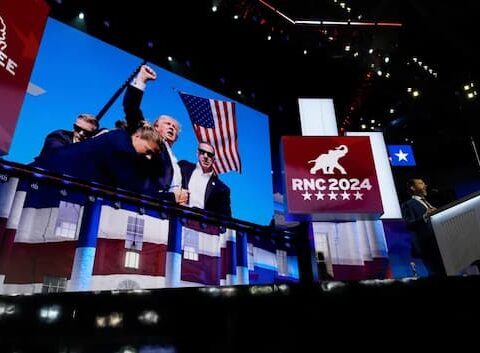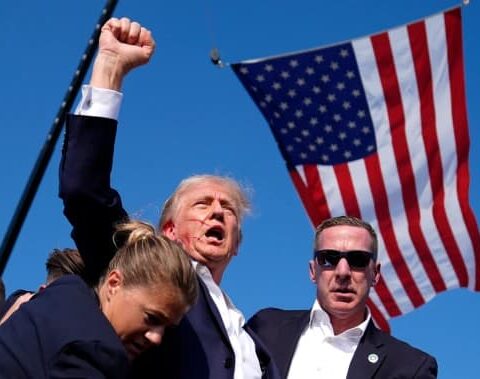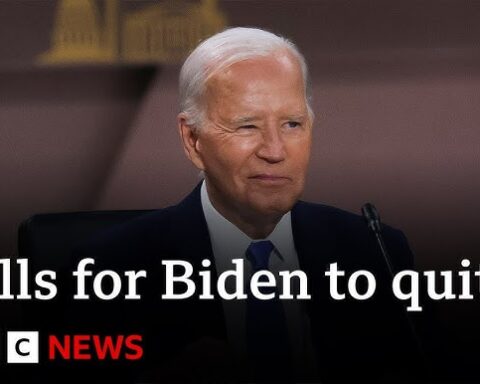So… Haiti. And the assassination of its president, Juvenal Moise.
What on earth was that about? The various, often conflicting, reports in the media ever since the assassination on July 7th have done very little to provide a clear, concise picture of what happened or why. There are lots of breadcrumbs and little oddities: but the overall picture remains nebulous.
And this – as we will get to at the end of this – is precisely why these things are done this way: with dummy/front organisations, foreign mercenaries, and smoke and mirrors, etc. Because it makes easier to obscure the trail. And, in the end, although theories and counter-theories might abound, no definitive conclusion is officially drawn.
Look, for example, at how The Guardian headlined its article on the assassination: ‘The assassination of Haiti’s leader remains shrouded in mystery: ‘We may never know’…’
And that’s probably the idea.
Haiti is a country defined by crisis, corruption, dysfunction, conspiracy, and – perhaps crucially – foreign interference. It is also probably the epitome of a neo-imperialist victim state or play-thing: it has rarely, if ever, been in control of its own destiny.
Looking at some of its recent history, its relationship to the US, and its geopolitical situation, will be useful in painting a picture of both the dynamics of the country that Juvenal Moise presided over and the sequences of cause and effect that have led to the present situation.
Haiti is also the epitome of the archetypal dynamics between the wealth-owning elites and a corrupt political system on one hand and the common people or expendable population on the other. As we look at the details and breadcrumbs concerning this assassination – Colombian mercenaries, Miami-based plots, and all – what emerges most is an apparent story of feuding elite interests and neo-colonial interference.
The first thing to establish is just how bad things in Haiti are for the common people.
According to the World Bank, 60% of Haiti’s population of over 11 million people lives below the poverty line. Its currency, the gourde, depreciated 30% in 2019, inflation is nearly 20%, and a huge portion of the population is experiencing starvation and scarcity of basic goods and services.
And the level of corruption in the country is so bad that even outside attempts to help Haiti always seem predestined to fail.
A good example is highlighted here in this FT article from 2019, which paints the picture: ‘Scrawled in Creole on the walls of Port-au-Prince are the words: “Kot Kòb Petwo Karibe a?” — “Where is the PetroCaribe money?” It is a question posed by the protesters who have been trying to oust Haitian President Jovenel Moïse for the past year.’
PetroCaribe was an initiative set up in 2005 by Venezuelan president Hugo Chávez. The idea was to give Caribbean countries the option to buy Venezuelan oil on fair terms: and that cheaper oil from Venezuela would mean the participating countries would have to use the money they’d saved to improve infrastructure and the economic situations at home. This initiative sounds not dissimilar to some of what Gaddafi had been trying to do in Africa – particularly trying to establish his gold-backed African currency.
In Haiti, which was supposed to be part of this Chavez programme, it was evident that the money wasn’t going towards public works or the common good.
As FT reported, ‘Haiti’s court of auditors reported that officials mismanaged up to $2bn of PetroCaribe cash…’ And enterprises involving Moise himself were also thought to be complicit.
Clearly, those Haitian elites were up to their same old tricks: the people were not seeing any benefits from the deal.
At the micro level, you have the Haitian elites and corruption getting their fill, at the expense of the common population: and at the macro level, you of course have Haiti itself as a puppet state or victim-nation being controlled or fed off by broader, more international elite interests. That’s the dynamic: and this assassination, along with almost everything that goes on in Haiti, probably needs to be viewed within that context.
The assassination of Moise came at a time when Haiti was already being shaken by mass unrest and protests.
Moise, who had cancelled elections and was seen by many Haitians as holding on to power illegitimately, was seeking to create a new constitution that would afford more power to the president: he claimed this would put an end to the fruitless bickering between the executive and the legislature; and would allow things to get done.
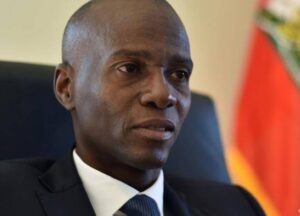
To some, this sounded like dictatorship – in a country that has a long and bloody history of dictatorship already.
Clearly, the politicians in Haiti have been doing fuck-all for the common good of the people: Haitians have been protesting en masses for ages, fed up of government corruption, food scarcity, economic hardships, rampant criminality in the streets, etc. However, Juvenal Moise himself was the object of much of the Haitian protest: being mired in allegations of corruption. And the amount – and the longevity – of protests against his leadership suggest he was not a popular figure (despite subsequent rewriting of the narrative since his murder). And most evidence prior to his assassination seemed to suggest Western governments were in favour of him.
However, in keeping with Haiti as a victim state or play-thing of foreign masters, it’s ‘president’ at any given time is presumably expendable – if there are better options on the table.
Ezili Dantò, a lawyer working to protect Haitians civil and cultural rights, writes, ‘Let’s be clear, the colonial puppet, Jovenel Moise, murdered his people, was an indicted drug money launderer and used toxic gas against school children, pregnant women, protesting demonstrators. He used the foreign-trained militarized police and sold-out media to silence and censor demonstrators.’
The activist continues, ‘Just a few weeks ago, I spoke to a source who told me Jovenel was looking for a way out. He didn’t want to spend the rest of his life running away from war criminal charges for all the massacres he presided over for the Colonists while in power. Jovenel tried to push an amendment to the Haiti constitution that would give him immunity from prosecution after his term was over… Jovenel could have also been afraid of an indictment for money laundering and drugs which the DEA/CIA/CoreGroup nations held over him his entire term in office… Jovenel saw the handwriting on the wall and started to look for new allies to leverage against his Western handlers to save his skin after he’d finish doing the U.S. dirty job in Haiti and his term was over.‘
Clearly, *something* was going on with Moise.
In terms of common online theories that the US was behind the assassination, I’m not sure it’s that straightforward.
It’s difficult to ascertain any obvious motive for the US to want the Haitian President assassinated at this time. However, that doesn’t rule out possible US-linked actors – or even US-based agencies (the CIA) – from being involved in the plot: and possibly acting without approval from the US government. Which is something we’ll come back to.
American involvement in Haiti goes back well over a century. For the bulk of that period of time, the US involvement can generally be said to have been negative: including propping up harsh dictators (the notorious ‘Papa Doc’ regime was backed by the US for years) and also training Haitian Death Squads to terrorise opponents.
In terms of relatively recent history, the US – at least on the surface of it – has arguably tried to nurture or maintain democracy in Haiti and to keep it from slipping back into dictatorship.
There’s a familiar story that seems to recur throughout the modern history of Latin American or Caribbean nations: which is democratically elected governments, mostly left-leaning, being quickly overthrown by right-wing military coups – essentially doing the bidding of the wealthy elites and oligarchs. Over the last several decades, you can see this happened in Brazil, for example, in Argentina, in Chile, Nicaragua, and several other countries (most recent of which was Honduras: and, arguably, Brazil again with the ousting of Dilma Rousseff and the rise of Bolsonaro).
In most of these cases, the United States was directly involved in the coups and in the propping up of the dictatorships. In Haiti, however, in the 1990s, the story is a little more complicated. The US and the West did support the older Haitian dictatorship – a particularly brutal one – but in 1990, when Jean-Bertrand Aristide was elected president with an overwhelming majority in the nation’s first-ever democratic presidential election, the US appeared to be on his side.
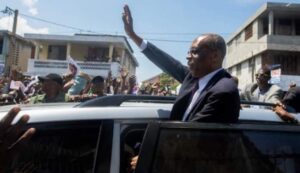
Aristide, by all accounts, directly challenged the corrupt stranglehold of the country’s ruling elites and tried to institute policies aimed at raising living standards and organising a fairer situation for most Haitians: naturally those elites reacted badly to his policies and staged a military coup in 1991, forcing the president into exile just seven months after the country’s first ever elections.
As with a number of these right-wing military coups in Latin America, it was especially violent and brutal: including the mass rape of civilians and the murder of some 5,000 supporters of the president in a period of just three years. As TIME magazine reported, these brutal repression tactics included victims being tortured and “made to lay in open sewers before being shot”.
Israel was also involved in shipping in large quantities of weapons for the coup plotters.
In 1994, US President Bill Clinton authorised the US military to intervene in Haiti against the military junta and restore democracy. This appeared to be one of the few times in recent history that the US was on the right side of the fight.
Is it that straightforward though? The matter is complicated by the apparent fact that at least one key member of the anti-democratic junta was on the CIA payroll (apparently to feed the agency intel on the situation). This individual, Emmanuel Constant, in fact also led one of the Haitian Death Squads involved in the brutal killings mentioned above.
So… regardless of what Bill Clinton or the US government was trying to do in Haiti, it remains unclear what the CIA was up to: and whether the US government and the CIA were actually at odds (it wouldn’t be the first time: Kennedy, the CIA and the Bay of Pigs, for example).
Michel Chossudovsky, writing in 2004, argued that the 1991 coup was a CIA-backed operation. He also made the case for the US being behind the 2004 coup. The Haitian armed forces were in fact disbanded and the US State Department employed the mercenary company DynCorp (yes, that DynCorp) to oversee the restructuring the Haitian National Police (HNP), which would in short order become an instrument of violent population control.
While the US did restore democracy to Haiti, it was short-lived and Haiti’s problems continued. Aristide’s government was again overthrown in 2004, requiring further US intervention.
Haiti has been existing as more or less a failed state ever since then: a political system mired in corruption, with a general population living in abject conditions. There have also been constant scandals, involving everything from massive-scaled money laundering, questions about the activities of the Clinton Foundation, misuse of aid money, and even UN Peacekeepers raping or trafficking Haitian children and women (yes, UN Peacekeepers: DynCorp aren’t the only ones who get up to that stuff).
While this whole story of the assassination of Haiti’s president is presently a blur of confusion, it seems important to try to make sense of what’s in play here: because the chaos and instability in Haiti is being echoed in other places too. For example, what’s presently going on in South Africa. Or even what’s going on in places like Cuba and Venezuela – where it would be very easy, amid all the unrest and chaos, to have covert ops carried out without any clear sense of what really happened or who was behind it.
And anywhere where Columbian mercenaries show up is somewhere that needs to be watched closely.
So let’s a look a little more closely.
Three of these Columbian mercenaries are apparently dead now, and eight are reported to still be at large.
According to some reports, there also seems to have been confusion among the mercenaries as to what their actual mission was. For example, relatives of the detained suspects say they ‘were there to provide security for wealthy people’. This is interesting, because the implications are that these private contractors were being hired in general to work for the wealthy elites. For example, as this Miami Herald article explains, the wife of one of the suspects told a Colombian radio station that her husband had been ‘paid $2,700 and provided travel to the Dominican Republic to work as private security for powerful families‘.

The Colombians reportedly told investigators they had been hired by CTU Security, a private security firm near Miami.
CTU Security is founded and directed by Antonio Enmanuel Intriago Valera, reported to be a Venezuelan exile living in Miami.
The Miami connection appears to be substantial, as this ItalyNews24 article tells us: ‘The mediator who according to Haitian prosecutors would have financed the operation would be in Miramar, a small town just outside Miami, and also the one who according to the investigations could be the leader of the operation, Christian Emmanuel Sanon, is a Haitian who lives and works for years now in Miami…’
According to a report in the Miami Herald, this Intriago claimed to have connections to or to have worked directly for U.S. agencies: ‘A person claiming to have known him back in Venezuela said Intriago… would boast of being a paid mercenary and a coordinator of special forces…’
And then there’s this. A little Google Search finds a June 30th article in the Orinoco Tribune, which reported that the ‘CIA Director Arrives in Columbia to Lead ‘Sensitive Security Mission’.
Given the CIA’s long history of covert ops in Latin America and in assassinations too – not to mention the reported involvement of Columbian mercenaries in the Haitian leader’s assassination – one wonders what this ‘sensitive security mission’ was exactly.
The article says; ‘The highest official of the United States Central Intelligence Agency (CIA), William Burns, arrived in Colombia to participate in a “delicate” mission in terms of security, as part of the “cooperation” between the two countries… The Colombian ambassador in Washington, Francisco Santos, reported on the arrival of the CIA director, however Santos did not want to provide additional details about Burns’ visit to Bogotá. “I prefer not to tell you it is a delicate mission, an important mission in terms of intelligence, that we managed to coordinate,” Santos replied obliquely when asked about the mission.’
The piece – dated barely a week before the assassination of Juvenal Moise in Haiti – doesn’t mention Haiti at all, and is in fact more leaning towards possible operations targeting Venezuela. But with what unfolded in Haiti days later, we can obviously look at this CIA director’s presence in Columbia and wonder if it was somehow a precursor to the Haitian assassination plot.
So… does this link back to the CIA?
The business of the CIA Director making that veiled visit to Colombia just days before the assassination is certainly curious.
And the Miami connections are interesting, because Miami has generally been where Latin American expats are based and where plots against Latin American or Caribbean governments tend to be hatched (think Venezuela, Cuba, etc, and US agencies working with anti-government exiles to plot against Castro or Chavez or Maduro or whoever else). This Miami connection goes all the way back to the Bay of Pigs and the JFK era.
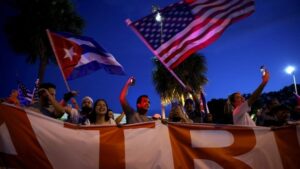
That’s why Miami is always the heart and center of anti-Cuba activity – such as is happening right now, in fact. It is also, again, full of Venezuelan and Haitian exiles. It is also heavily involved cocaine and drug trafficking operations, so there’s a lot of illicit money flowing through there to help finance covert ops.
There was, for example, the botched coup attempt in Venezuela in May 2020, which was linked to private contractors in Miami/Florida. The operation, aimed at overthrowing the Venezuelan government, ‘involved two fiberglass motorboats owned by Silvercorp which launched from eastern Colombia toward the Caribbean coast of Venezuela north of Caracas. The boats were carrying approximately 60 Venezuelan dissidents and two American former Green Berets employed as mercenaries by Silvercorp. Eight Venezuelan dissidents were killed and seventeen invaders were captured, including the two American security contractors, whose interrogations were broadcast on state television in the hours following the event.’
The way this event in Venezuela was generally presented is as a sort of rogue operation: the CIA denies involvement, as does the US government – and, in fairness, that might explain why it was such a botched operation. It’s entirely possible that rogue actors carried out the plot without official approval: or it’s also possible that the US government simply looked the other way and the CIA engaged in plausible deniability.
A similar dynamic could be in play regarding Haiti and the Moise assassination.
Miami is also where US Southern Command (SOUTHCOM) is headquartered. SOUTHCOM’s activities in Latin America and the Caribbean center on “military operations and promote security cooperation to achieve U.S. strategic objectives”, with speciality being counter-insurgency operations. SOUTHCOM has also recently established military bases in Colombia.
So it seems entirely possible that the CIA or elements of the military might’ve worked with Haitian expats – especially if the Venezuelan exile running CTU Security had agency connections – and that the CIA Director’s trip to Colombia was part of the planning process for Colombian mercenaries to be used.
There also appears to be direct connection between some of the actual Colombians arrested in Haiti and the US. As it happens, the Pentagon has ‘confirmed that some of those Colombian veterans had received training from the United States military, as part of a cooperation between security forces that has stretched for decades.’
But again, going back to the Kennedy dynamic, the possible involvement of the CIA or other US elements doesn’t necessarily mean the US government or the Biden administration was complicit or even knew what was going on: the CIA, as has been shown on various occasions, can pretty much do whatever it wants.
And again, any US involvement in the assassination plot might’ve been the work of rogue actors.
There’s also another question: were the Colombians actually brought in to be the fall guys? Were the Colombians actually framed for the assassination, with the actual plot being carried out by Haitian elites and political figures using the President’s own security people?
It would explain why, as various reports seem to suggest, the Colombians appeared confused about what their assignment was: and also why President Moise’s own security reportedly did nothing to protect him.
Haitian elites and corrupt officials seem to be more likely to have been behind the assassination than anyone else. They were almost certainly involved or maybe even the instigators – irrespective of whether their actions were also facilitated or aided by foreign parties. It might’ve been a case of said elite figures using their influence to conspire with US-based expats and assets, while the likes of the CIA simply looked the other way and pretended not to notice.
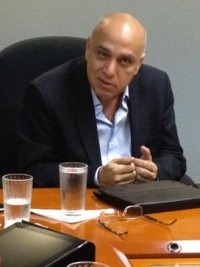
Take Reginald Boulos – an opposition leader and an industrialist, one of Haiti’s wealthy elites. Even his small Wikipedia entry tells us that ‘Reginald Boulos has never been elected to a public office; however, his involvement with the Haitian political system, as a representative of the Private Sector, has been far greater than it would be welcome in any democratic system…’
Wikileaks documents also confirm Boulous was involved in the aforementioned coup against the democratically elected Aristide in 2004: and was specifically involved in weapons smuggling to arm the DynCorp-trained National Police during the coup. He was a supporter of both the 1994 and 2004 coups. As it happens, Boulous – who also has some connections to the John Hopkins Center – owns a pharmaceutical company and was previously responsible for poisoning scores of children with tainted medicine.
We are told, as of July 7th (the date of Moises’ assassination), that Boulous is not only seeking to run for president, but that ‘Dr. Boulos is interested in building constructive partnerships with leaders in the United States government and the Haitian American diaspora community.’
One of the Haitian-Americans arrested as part of the squad that apparently murdered Moise was James Solages – who, it turns out, previously worked as personal security for Reginald Boulous.
Claude Joseph, another of the key figures putting themselves forward to lead Haiti, used the assassination to call for US forces to be sent into Haiti. Joseph, a product of the US-backed National Endowment for Democracy, was previously revealed by Wikileaks cables to have also been involved in the coup against Haiti’s only-ever democratically-elected leader Jean-Bertrand Aristide and personally implicated in some of the violent acts during those events.
Meanwhile, Dimitri Hérard, head of security at the National Palace (and thus widely implicated in Moise’s murder), is under investigation by the US for arms trafficking. Curiously, the New York Times reported that ‘Hérard, made several stopovers in the Colombian capital, Bogotá, in the months before the assassination.’
Also curious, one of the two Haitian-Americans involved in the assassination (either Solages or Joseph Vincent – we don’t know which) had, as Reuters confirms, ‘been an informant to the U.S. Drug Enforcement Administration’. Though, apparently, he wasn’t working for the DEA at this point (though, curiously, video recording of the night in question appeared to record someone shouting that they were with the DEA).
This is just scratching the surface.
But all of these dubious figures and connections cited here are just to show the extent to which ambitious plotters, almost entirely among the ruling elite (and all with connections to the previous anti-democratic coups), were likely to have been the instigators of the plot: the problem is, especially for the investigators, to work out exactly which figures were behind it and what webs of alliances were in play.
The prevalence of Columbian mercenaries stems from the close relationship between the US and Colombia: and the US seems to use Colombian ex-military for destabilisation and regime change operations in Latin America, such as in Venezuela or Cuba.
Which is something that both the Cuban and Venezuelan governments are going to need to watch for – especially right now, with the mounting protests against both governments. One in fact wonders how much what just happened in Haiti might relate to – or be a precursor to – potential anti Cuba or anti Venezuela operations.
The involvement of Columbian mercenaries in itself is interesting for lots of reasons: one of them linking back to the long piece I wrote about Blackwater founder and America’s mercenary-in-chief Erik Prince a few years ago, in which one of the things we explored was Prince’s use of mercenaries from various countries being sent in to different parts of the world to engage in private operations. Prince, among other things, was specifically shipping Columbian mercs over to the Middle East, for example – essentially giving Gulf State governments access to these Colombians.
Without necessarily linking Prince himself to any of the Haiti business, the implied system of hiring mercenaries (especially Columbian ones) for various foreign operations is what’s curious. They seem to be the go-to guys for these sorts of things.
One of the obvious ‘benefits’ with private contractors and mercenaries – it can be impossible to trace the operations back to their source. Which is why this future that people like Erik Prince are so invested in – the apparent replacement of traditional agencies or operatives with ‘private armies’ and guns-for-hire – is so dangerous: essentially, anyone can can hire these guys to do anything and there’s no chain-of-command from which to trace the orders back to their origins.
You couldn’t look at this Haiti assassination, for example, and trace it cleanly to the CIA: nor to the US government, nor even necessarily to anyone in the Haitian government (although various parties are doing all three). The investigators don’t seem to be able to put together a definitive picture (assuming they’re even meant to) – and, as already pointed out, even the Columbians seemed (according to reports) confused about what they were supposed to be doing.
Any sufficiently wealthy individual could hire these types of operatives to carry out these types of operations, independent entirely of any government-related agencies or oversight.
Think about the implications of that: millionaires or corporate big-wigs can employ operatives, for example, to take out activists or protest leaders. Think, for example, about the dynamics in somewhere like Brazil, where there’s rampant political corruption, a right-wing corporatist government at war with the poorer classes, and corporations in conflict with indigenous peoples over land rights and environmental issues.
I covered, as another example, the assassination of the environmental activist Berta Caceres in Honduras: an assassination apparently carried out by US-trained ‘death squads’ working for a combination of right-wing dictatorship and corporate interests (in a country, again, in which the democratically-elected leader was overthrown by a US-endorsed military coup).
Again, look at how The Guardian headlined its article on the assassination: ‘The assassination of Haiti’s leader remains shrouded in mystery: ‘We may never know’…’
You almost suspect that this ambiguity is desired: and may be designed to be permanent. Hell, decades later and people are still trying to figure out who assassinated John F. Kennedy – and how many layers of interests were involved or complicit in that murder in Dallas in 1963. The latest updates are saying that even those investigating the murder of the Haitian president are now in hiding, facing serious threats to their safey.
And Haiti is itself a prime example of a country being run by its wealthy elites, while the people starve and fight among themselves. Again, look at what one of the Colombians thought he was in Haiti for, as referenced earlier: to provide protection for ‘wealthy individuals’.
That’s all that goes on here: the wealthy elites dictate the course of events, while siphoning off all of the country’s resources and the people’s money – and they occasionally fight among themselves for power and profit, while the people fight among themselves for food and shelter.
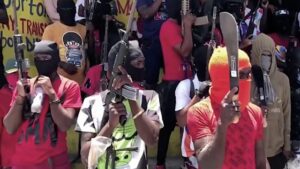
The people have got no chance. When it isn’t the ruthless elites they’re contending with, it’s the criminal gangs who pretty much rule Haiti at the street level now: though, as this AP piece tells us, even the ‘gangs in Haiti have long been financed by powerful politicians and their allies — and many Haitians fear those backers may be losing control of the increasingly powerful armed groups who have driven thousands of people from their homes as they battle over territory, kill civilians and raid warehouses of food.’
Haitians can’t trust their politicians. They can’t trust foreign interventionists like the US or France or Canada. They can’t even trust foreign ‘peacekeepers’ – again, the UN Peacekeepers were running sex trafficking operations using Haitian children and women. And if the accusations against the Clinton Foundation are true, then they can’t even trust international aid groups.
While the rich power players fight over control and profit, the people are literally fighting over food and basic supplies. It’s a real life Hunger Games. What a world.
More: ‘From Rousseff to Bolsonaro: A Demonstration of How the Old Elites Win‘, ‘The Migrant Caravan, Co-Opted Conspiracies & the Truth About Honduras‘, ‘Hillary Clinton & the Murder Capital of the World‘ ‘The DYNCORP Rabbit-Hole: Child Trafficking, Black Ops & More‘, ‘Erik Prince, the Mercenary Future & the New World Order‘…

